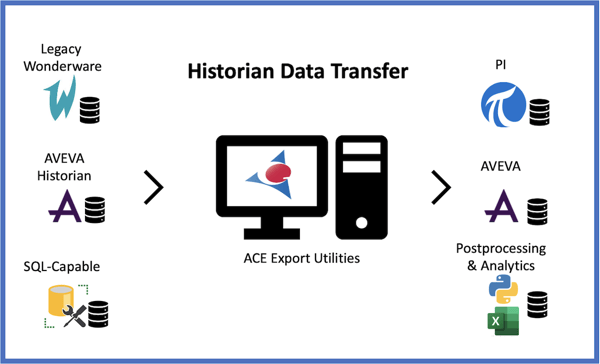As businesses and industries evolve, many engineers and managers find themselves struggling with changing business requirements around their historians. Perhaps the company is moving from one technology platform to another to get some product-specific functionality/synergy. Maybe they are trying to standardize their systems across a larger array of sites. Or perhaps they are simply performing an upgrade of a legacy historian – getting it back to a supported operating system or software level. Regardless of the motivation, the ability to easily transfer data between two or more historians is crucial for ensuring business requirements can be met.
The Challenge of Data Transfer
Changing historian requirements may be necessary to meet business goals, but they also pose technical challenges which can be very painful. This pain causes projects to be pushed off, delayed, and ignored, allowing legacy historian systems to remain in place beyond their expected end of life. Systems which should be some of the most important, those which safeguard company data, end up becoming some of the most vulnerable. In certain industries, this can result in serious fines and even recalled product if data integrity cannot be validated.
After years of working with clients to help them overcome these issues, ACE recently created a set of tools that ease migrations from legacy Wonderware or AVEVA historians. These tools take the form of a set of SQL scripts which, along with supporting expertise from the ACE team, streamline the process of extracting data files from legacy historians. The files can then be transported to and consumed by newer systems, such as an upgraded AVEVA historian or a PI historian.
Eliminating Data Gaps
The result is access to historical data previously locked away in legacy systems or siloed apart from a fleet-wide view. The tools work well with a parallel data collection strategy, which is often the recommendation for system changes. With this strategy, both the legacy and modern historians can be running at the same time during the transition, allowing data points from the two systems to be compared for accuracy.
Once the new historian is validated, legacy data can be backfilled as needed to ensure there are no gaps – often critical for regulatory requirements. Since the scripts are built on SQL server, there is typically no need for additional software installation. The ACE team visits the client’s facility to perform the data migration onsite.

Historian Data Retrieval Options
The new ACE tool offers a great amount of flexibility for extracting historical data; clients can choose different retrieval modes for different time frames, or even multiple retrievals for the same time frame. For example, a client may choose:
- Full data retrieval: Extract the data exactly as it exists within the legacy historian. This is often needed to meet corporate guidelines/regulatory requirements.
- Delta retrieval: Save space by only extracting a data point when the value changes, transferring all meaningful data but removing what is not additive to the trend.
- Cyclic retrieval: Extract data on a specified time interval, interpolating in the space between data points. This can conserve space by modifying data resolution across the point’s history.
- Mixed-strategy retrieval: Mix and match the above retrieval strategies, but for different time periods or subsets of points. Useful when more nuanced retrieval is desired, such as full retrieval for data points in the past 5 years, but delta retrieval for data points older than that.
By streamlining data transfer from historian to historian – especially from legacy Wonderware or AVEVA historians to PI historians – companies can realize substantial time and cost savings. Changing historian requirements are inevitable, and the technical challenge is one that ACE is well-equipped to solve. We have the tools and expertise to help you avoid risky data gaps, historian downtime, and potential regulatory issues.
Contact us to discuss your historian needs, and to learn more about ACE’s data migration tools and capabilities.

